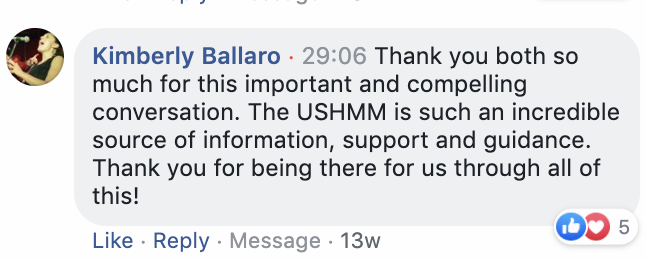
Each year, 1.7 million visitors tour the United States Holocaust Memorial Museum to learn about Holocaust history, honor the victims, and recognize the resilience of Holocaust survivors. With Museum doors temporarily closed during our busiest season due to COVID-19, we wanted our audience to know that learning about the Holocaust doesn’t have to stop.
Staff embraced this opportunity to expand our reach to a global audience including educators, students, the general public, Museum members, and supporters. With smart planning and an existing base of digital resources, the Museum was perfectly positioned to provide teachers and students learning remotely with accessible educational content and the general public with inspiring stories of resilience, resistance, and uncommon kindness during the Holocaust.
Through the personal experiences of rescuers, survivors, liberators, victims, and even perpetrators, we sought to connect with audiences who might not intuitively see the relevance of Holocaust history to their lives.
We worked to create opportunities for a community of followers to learn and think deeply not only about “What would I have done?” but also about “What will I do?”
In April 2020, with the expertise of Museum historians, curators, Holocaust survivors, educators, and artists, the Museum launched a weekly, unprecedented 30-minute Stay Connected programming series on Facebook Live.
Produced on Zoom and broadcast to Facebook Live, every show is heavily researched, carefully scripted, rehearsed, and promoted to encourage audience engagement and conversation. Each episode featured our host, Historian Dr. Edna Friedberg, in conversation with expert guests examining key moments in Holocaust history grounded in oral testimony, historical photos, and artifacts from the Museum’s vast collection. With real-time audience engagement, producers shared audience questions with the host and links to Museum resources to inspire critical thinking, inquiry, and exploration.
As audiences began to adapt to living in a pandemic, programs initiatilly focused on powerful stories of rescue, survival, and the choices of individuals that made a difference during the Holocaust. Topics were pegged to key anniversaries and relevant Holocaust history that mirrored the uncertain times that viewers experienced in the spring and summer of 2020.
For example, we introduced our viewers to teachers, faith leaders, and even the Warsaw zookeeper and his wife, all of whom risked their lives to save others. As the conversation in America shifted in response to the murder of George Floyd, our focus broadened too. To highlight unlikely allies, we shared the story of Martin Niemoller, a German pastor who once supported the Nazis before becoming a vocal critic. We discussed art as a form of protest, showing contemporary art made in response to modern day protests as well as protest art depicting Nazi brutality as a means of encourging American intervention in the war.
Ahead of each show, we teased the program on Facebook and Twitter, with specific content built for each channel, to our more than 1.5 millions followers with stories, videos, and photos that would appear in the program. We also used Instagram to highlight the stories told in each program.
The show is promoted each week through a Stay Connected email series, which features a half dozen must-read, watch, and listen items and educational resources pegged to that week’s theme. An email also is sent approximately ten minutes before the show begins, prompting viewers to watch with an easily accessible link and program summary.
To expand beyond the core audience following the Museum, we designed unique targeting for each program—placing paid advertising and engaging affinity groups to reach audiences interested in music, art, education, the military, and more to demonstrate how Holocaust history holds powerful lessons for them today. Each show, we activated our teacher and education network through email and social media to encourage them to incorporate that week’s episode into their lessons.
This cross-promotion brought new viewers to the Museum’s live programming, including those who previously did not follow the Museum on social media and learned to navigate a new platform so that they could ask questions and watch the weekly programs. They are now some of our most engaged and reliable viewers.
Since Stay Connected began in April, we have produced 16 shows. With more than 2.2 million views, 4.5 million impressions, 477,000 engagements (including 97,000 likes, 11,000 comments, and 17,500 shares, and 22,000 clicks), it is our most successful virtual program ever. For comparison, our Facebook Live programming had 700,000 views in 2019.
The email series sent 5.2 million emails, bringing over 66,000 people to ushmm.org. Over 40,000 were new users. Our Facebook page gained approximately 130,000 new followers.
Viewers from more than 50 countries engaged in the conversation and shared personal, heartfelt stories, joining from El Salvador, Philippines, Brazil, Germany, Canada, Mexico, Uganda, France, Colombia, Israel, Chile, Peru, the United Kingdom, Australia, Italy, South Africa, Argentina, Iraq, Sweden, and Paraguay.
One viewer commented, “Another outstanding insight into the many aspects of the Holocaust. Thank you for continuing to educate through telling these stories.”
Another noted, “Wonderful images to use in my class on American government / civics! Icons, symbols and how they are used - we really need to be so aware of this in the current political (fraught) atmosphere.”
COVID-19 changed how we do our work, but not why we do it. From Anne Frank to Pride Month, liberators, teachers, and doctors, viewers explored Holocaust history and its relevance. While the Museum remains closed, these programs have become essential to our work and a lifeline to an audience seeking inspiration and educational resources now more than ever.









